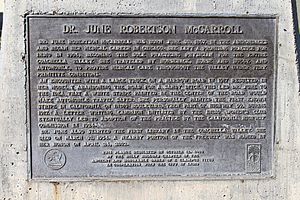June McCarroll facts for kids
Quick facts for kids
June Adaline Whittlesey Hill Robertson McCarroll
|
|
|---|---|
| Born |
June Adaline Whittlesey
June 30, 1867 Lewis County, New York, US
|
| Died | March 30, 1954 (aged 86) |
| Alma mater | Allopathic Medical College, Chicago |
| Occupation | Nurse and physician |
| Employer | Nebraska State Schools, Bureau of Indian Affairs, Southern Pacific Railroad |
| Known for | Painting the first striped lines on highways (disputed); starting the Coachella Library |
| Spouse(s) |
|
June McCarroll (born June 30, 1867 – died March 30, 1954) was an important American nurse and doctor. She is often given credit for coming up with the idea of painting lines on highways. These lines help separate traffic lanes and make roads safer.
However, there is some debate about who first painted these lines. The California Department of Transportation says June McCarroll had the idea. But the Federal Highway Administration and the Michigan Department of Transportation say two men in Michigan painted centerlines before her.
June McCarroll was born in Lewis County, New York. She worked as a nurse and later became a doctor for the Southern Pacific Railroad. In 1917, she had a close call while driving her Ford Model T car. This made her think about road safety. A historic marker in Indio, California, says she then painted the first known stripe in California. This was on Indio Boulevard, which was part of U.S. Route 99 at the time.
Contents
Early life and career
June McCarroll grew up in the Adirondack Mountains in New York. Her mother, Adaline, passed away when June was very young. Later, her father moved to Emporia, Kansas, where he served as mayor for a while. By 1888, her father had moved to Los Angeles, California. June later joined him there.
June McCarroll went to medical college in Chicago. She became a physician, which is another word for a doctor. In 1904, she moved back to Southern California with her second husband, James R. Robertson. They hoped the desert climate would help him with his health. Sadly, Robertson passed away in 1914.
Two years later, she married Frank Taylor McCarroll. He was a station manager for the Southern Pacific Railroad. From 1907 to 1916, June McCarroll was the only doctor in a large desert area. This area was between the Salton Sea and Palm Springs, California. She also served as the only doctor for five Native American reservations in that region. She worked on behalf of the Bureau of Indian Affairs.
The idea for highway lines
In the fall of 1917, June McCarroll was driving to her office near Indio, California. She was on a road that later became part of U.S. Route 99. This road is now known as Indio Boulevard. She had a very close call with another car. This made her realize how dangerous the roads were without clear markings. She thought that painting a line down the middle of the road would help drivers stay in their lanes. This would make driving much safer for everyone.
McCarroll shared her idea with local groups, but they didn't act on it. So, she decided to take action herself. She personally painted a white stripe down the middle of the road. This showed how wide each lane should be and helped prevent accidents.
June McCarroll didn't stop there. She worked with the Indio Women's Club and other women's groups. They started a big letter-writing campaign across California to promote her idea. In November 1924, the California Highway Commission finally adopted her proposal. They painted about 3,500 miles (5,600 km) of lines on roads. This cost $163,000 at the time. Eventually, the idea of painted highway lines was adopted all over the world.
Honoring June McCarroll
On April 24, 2002, California officially named a part of Interstate 10 near Indio the "Doctor June McCarroll Memorial Freeway." This was to honor her important contribution to road safety. In October 2003, a special plaque was placed in Indio, California. It is located at the intersection of Indio Boulevard and Fargo Street. The plaque remembers June McCarroll and her work.
Who painted the first line?
While June McCarroll is famous for her efforts in California, there is a debate about who painted the very first highway centerline. The Federal Highway Administration says that Kenneth I. Sawyer painted the first highway centerline in Michigan in 1917. This was on what was then M-15. Photographs from that time clearly show this centerline.
Also, Edward N. Hines painted the first centerline on a city street in the Detroit area in 1911. So, neither June McCarroll nor Kenneth Sawyer can claim to have painted the very first centerline in the entire country. Edward Hines was even given an award in 2011 for his work.
See also
 In Spanish: June McCarroll para niños
In Spanish: June McCarroll para niños
 | May Edward Chinn |
 | Rebecca Cole |
 | Alexa Canady |
 | Dorothy Lavinia Brown |


